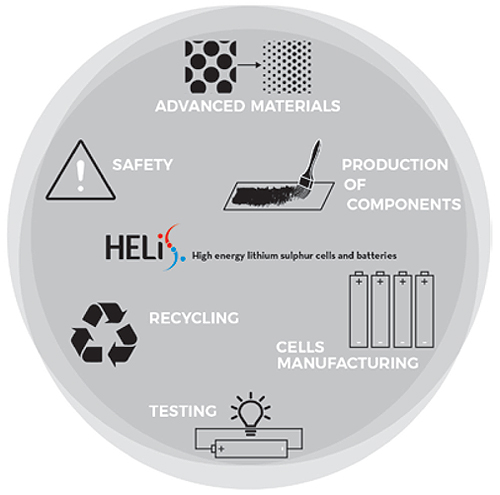High energy lithium sulphur cells and batteries.
Lithium sulphur batteries are a viable candidate for commercialisation of post Li-ion battery technologies due to their high theoretical energy density and cost effectiveness. Despite many efforts, there are remaining issues that need to be solved, providing the direction of lithium sulphur batteries' technological development.
Instability of the lithium metal in most conventional electrolytes and formation of dendrites due to uneven distribution of lithium upon the deposition causes several difficulties. Safety problems connected with dendrites and low coulombic efficiency with a constant increase of inner resistance due to electrolyte degradation represent main technological challenges. From this point of view, stabilization of the lithium metal has an impact on safety issues. A stabilized interface layer is important from the view of engineering of the cathode composite and separator porosity since this is an important parameter for electrolyte accommodation and volume expansion adjustment. Finally the mechanism of lithium sulphur batteries ageing can determine the practical applicability of the batteries in different applications.

The HELIS project (funded through European Union's Horizon 2020 research and innovation programme under Grant Agreement No. 666221) is addressing the remaining issues connected with the stability of lithium anode during cycling, engineering of the complete cell and questions about lithium-sulphur batteries cell implementation into commercial products. The consortium involves a joint collaboration with multi-disciplinary and complementary experts coming from 14 partners and 7 different countries: Slovenia, France, Sweden, Germany, Finland, Spain and Israel.
The work in the project is divided into 10 work packages and bundled into three major activities:
- coordination, management and dissemination
- lithium sulphur cell raw and advanced materials development, testing, scale up and modelling
- cell and battery pack characterisation together with research of ageing, safety and recycling.
The 4-year long project is finishing in May 2019. Before the end of the activities, three different series of lithium sulphur cell prototypes will have been produced, each with improvements suggested from research on the materials development. More specifically, larger quantities of novel carbon host matrices were produced, providing materials with characteristics required for production of prototype cells, while different analytical techniques were used for determination of favourable electrolyte composition. Several approaches for lithium metal protection against continuous degradation by modification of Li metal surface or separator were proposed and evaluated. The materials and components development was continuously supported by multiscale modelling of cell operation.
On the battery pack level, a battery management system (BMS) was developed and the lithium sulphur cells assessed through several safety tests. A life-cycle analysis was conducted, while also an efficient recycling process of Li-S batteries was developed in order to meet the European legislative requirements and the economic expectations of industry and consumers.
Together, the project resulted in 9 open access publications and few patent applications. The public deliverables and scientific publications that derive directly from the outputs of the project are available and downloadable at https://www.helis-project.eu/.
Acknowledgement: HELIS project has received funding through the European Union's Horizon 2020 research and innovation program under (Grant Agreement No. 666221)